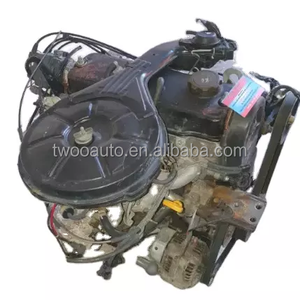Drive with Self-confidence: Toyota Tazz Engine for Sale, Genuine Parts Only
Drive with Self-confidence: Toyota Tazz Engine for Sale, Genuine Parts Only
Blog Article
Engine Buying Professional Tips on Picking the Right Engine for Your Certain Requirements
Selecting the appropriate engine for your specific demands involves a complex interplay of aspects that go past mere horse power figures. By delving into the intricacies of power versus performance, examining fuel ratings, and budgeting for long-lasting expenses, one can truly optimize their engine option.
Power Vs. Effectiveness: Discovering the Balance

When choosing an engine, it is crucial to strike an equilibrium between power and performance to satisfy your particular demands successfully. Power describes the engine's ability to generate power for propulsion, identifying variables like acceleration, hauling capacity, and general performance (Toyota Tazz Engine For Sale). On the other hand, performance associates to just how well the engine utilizes gas to create power, influencing factors such as fuel economic climate and ecological kindness
Achieving the appropriate balance in between power and performance is crucial due to the fact that an engine that is too powerful may consume extreme fuel, resulting in greater operating costs and unneeded stress on the environment. On the other hand, an engine that focuses on effectiveness over power may cause slow-moving performance, particularly popular scenarios like pulling heavy tons or driving uphill.
To make an informed choice, consider factors such as your regular driving conditions, the intended use the car, and your individual choices. By examining your needs and top priorities, you can pick an engine that strikes the best equilibrium in between power and performance, making sure optimal efficiency while lessening ecological effect and operating prices.
Understanding Engine Size and Type

Furthermore, engine type plays an important duty in figuring out the performance attributes of an engine. Usual engine kinds consist of inline engines, V engines, and rotating engines, each with its unique benefits and downsides. The engine kind affects aspects such as the engine's size, weight distribution, and power distribution. Recognizing the interplay between engine size and kind is vital in selecting an engine that lines up with your specific needs and concerns, whether it be power, efficiency, or an equilibrium of both.
Consider Your Automobile's Needs
If you are looking for an engine for a sturdy vehicle that will certainly be used for towing, you will certainly require a powerful engine with high torque capacities. On the various other hand, if you are picking an engine for a small car mostly used for city commuting, gas performance might be a more crucial variable to think about.

Evaluating Fuel Efficiency Rankings
Assessing gas efficiency ratings is a vital aspect of choosing the right engine for your lorry, making certain cost financial savings and ecological sustainability. Gas effectiveness helpful hints rankings, commonly determined in miles per gallon (MPG) for fuel engines or kilowatt-hours per 100 miles (kWh/100 miles) for electric engines, indicate how much a vehicle can travel on a particular amount of gas or power. Higher MPG or lower kWh/100 miles values represent much more reliable engines, converting to reduced fuel costs and lower carbon exhausts.
Furthermore, compare various engine alternatives within the same vehicle class to identify the most economical selection. Elements such as engine dimension, weight, the rules of aerodynamics, and hybrid or electric abilities can all affect fuel efficiency.
Budgeting for Long-Term Prices
Purposefully preparing for long-term costs is necessary when choosing an engine, making sure economic sustainability over the automobile's life-span. While the initial purchase price of an engine is a considerable variable, navigate to these guys it is vital to think about the long-term costs related to maintenance, repairs, and fuel consumption. Going with a more fuel-efficient engine may have a higher ahead of time cost yet can cause considerable savings gradually. Normal maintenance, such as oil changes, filter replacements, and tune-ups, is necessary to maintain the engine running smoothly and successfully, decreasing the risk of costly repairs down the line.
In addition, investigating the availability and expense of replacement components for the picked engine is vital in spending plan preparation. By thoroughly budgeting for these lasting expenses and factoring them right into the decision-making process, individuals can select an engine that not just fulfills their prompt requirements yet likewise continues to be cost-efficient throughout its lifespan.
Verdict
To conclude, picking the ideal engine for your certain needs calls for balancing power and efficiency, understanding engine size and kind, considering your vehicle's demands, examining gas effectiveness rankings, and budgeting for lasting expenses. By very carefully thinking about these variables, you can guarantee that you select an engine that satisfies your demands and supplies optimum efficiency for your vehicle.
To better refine the selection process of an engine that strikes the optimal equilibrium in between power and effectiveness, it is important to dive right into the intricacies of comprehending engine dimension and kind. Engine dimension refers to the complete quantity of air and fuel that can be pushed with the engine cyndrical tubes. Common engine kinds consist of inline engines, V engines, and rotating engines, each with its one-of-a-kind advantages and downsides. Recognizing the interplay in between engine dimension and type is essential in selecting an engine that lines up with your particular demands and priorities, whether it be power, effectiveness, or a balance of both.
Fuel efficiency rankings, commonly measured in miles per gallon (MPG) for gas engines or kilowatt-hours per 100 miles (kWh/100 miles) for electrical engines, show how far a visit lorry can travel on a specific amount of gas or electricity.
Report this page